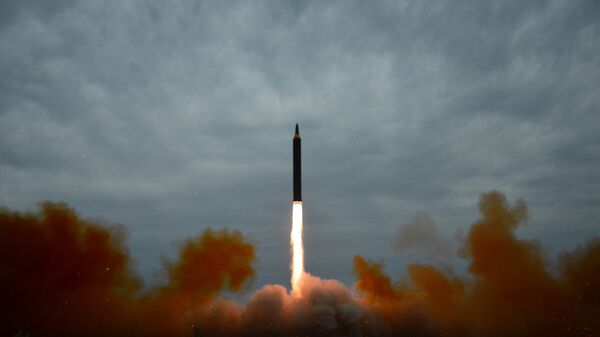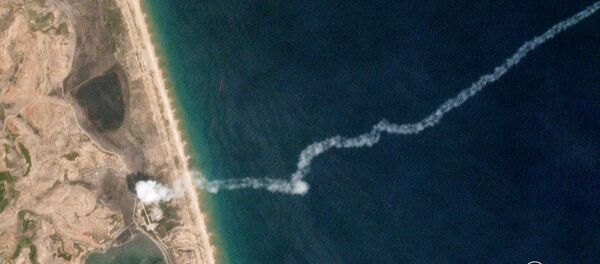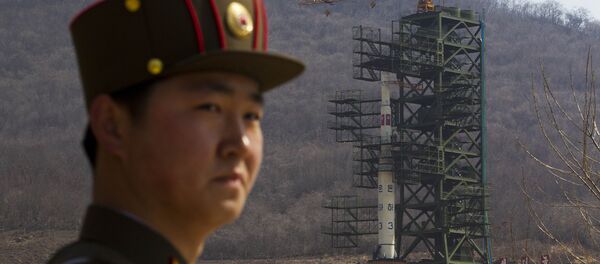The statement was carried by Pyongyang’s Korea Central News Agency (KCNA) and made by Kwon Jong Gun, director-general for US affairs at North Korea’s Ministry of Foreign Affairs.
"The dialogue would not open by itself, though the United States repeatedly talks about resumption of dialogue like a parrot without considering any realistic proposal that would fully conform with the interests of both sides," Kwon said. "If the United States is to move towards producing a result, time will not be enough."
The director-general denounced Washington’s dodging of a return to negotiations, saying it was "becoming more and more desperate in its hostile acts,” such as the White House’s decision last week to extend six executive orders imposing economic sanctions on the country aimed at halting its nuclear weapons and ballistic missile programs. Kwon noted that 80% of the Democratic People’s Republic of Korea’s (DPRK) economy is sanctioned at present.
"It would be difficult to look forward to the improvement of bilateral relations and denuclearization of the Korean Peninsula as long as American politics are dominated by the policy-makers who have an inveterate antagonism towards the DPRK," Kwon said. "If anyone dares to trample over our sovereignty and the right to existence, we will never hesitate to pull a muscle-flexing trigger in order to defend ourselves."
Particular ire was reserved for US Secretary of State Mike Pompeo, whom Kwon accused of “sophistry” and of “viciously slandering” the socialist country, following his comments over the weekend on new reports that attacked Pyongyang for alleged human trafficking and poor religious freedom rights. North Korean officials have attacked Pompeo in the past for behaving in a “gangster-like” manner and have requested the US send a “more mature” diplomat to negotiate with them, Reuters noted.
Earlier this week, North Korean leader Kim Jong Un told KCNA he had received a letter from US President Donald Trump that had “excellent content” and said would be “seriously contemplating” it, but did not elaborate further.
Since the summit in Hanoi in February fell apart amid disagreements about lowering sanctions against the DPRK and the irreversible destruction of its nuclear and ballistic weapons programs, attempts have been made to revive the talks and organize a third summit between the two world leaders. However, apart from some letters passed between Trump and Kim, little in the way of working-level talks has been accomplished.
However, with Trump in Japan for the G-20 summit and a scheduled visit to South Korea to follow, Stephen Biegun, Trump’s special envoy to the DPRK, has gone ahead of him to Seoul to see his South Korean counterpart, Lee Do Hoon. South Korean President Moon Jae In told reporters on Wednesday that reopening negotiations and setting up a possible third summit was at the top of their agenda.
It’s not yet clear what Trump will do in South Korea. South Korean Prime Minister Lee Nak Yon said on Thursday the US president would send “some kind of message” to Pyongyang from the demilitarized zone, but it’s unclear whether that visit will even take place. The last time Trump visited South Korea in November 2017, heavy fog prevented a DMZ visit.
Trump’s visit also follows the first visit by a Chinese leader to the DPRK in 14 years. Chinese President Xi Jinping visited Kim earlier this month to mark 70 years of friendship between the two socialist countries, which share a border. At that meeting, Xi pledged Beijing’s unconditional support for reviving friendly relations between the two countries, which have become strained in recent years as China tries to walk the careful line between supporting its historic ally and negotiating regional stability with a variety of other world powers, including the US.
Perhaps no site is more emblematic of the genesis of present tensions on the Korean Peninsula than the DMZ. A 2.5 mile-wide no-man’s land surrounded by fence and guard towers and dotted with landmines, the DMZ bifurcates Korea along the front lines where the 1950-53 shooting war between the North, South and their respective allies ground to a halt. With no negotiated peace treaty formally ending the war, nothing but a ceasefire has kept the conflict from reigniting since then.
Pyongyang and Seoul have taken major steps in the last year toward making the peace permanent, though, including signing an end-of-war declaration in September and negotiating the lowering of some travel restrictions between the two countries, among other joint initiatives. The two Koreas also competed together in the South Korean-hosted 2018 Winter Olympics under a united Korean flag.








